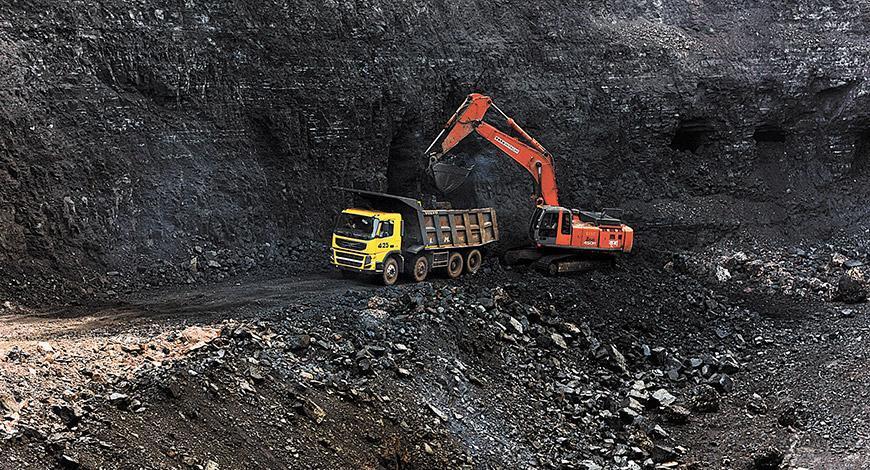Modi Govt’s Coal Reform Policy Quashed Over Environmental Concerns

Coal mining. (Representational Image)
New Delhi: In a jolt to the Narendra Modi government’s policy of watering down rules apparently to encourage the foray of corporate entities into commercial coal-mining, the National Green Tribunal (NGT) has barred power plants from arbitrarily switching over to cheaper coal without obtaining fresh environmental clearance.
On April 28, the southern bench of NGT nullified a policy in place for the past five years whereby thermal power plants were allowed to change their “source of coal”, irrespective of ash content, calorific values or potential environmental hazards.
The Union Ministry of Environment, Forests & Climate Change (“the ministry”) had issued the policy through a “office memorandum” dated November 11, 2020, without consultation with stakeholders or conducting scientific assessments. Setting aside the office memoranda, a division bench of the tribunal comprising judicial member Justice Pushpa Sathyanarayana and expert member Satyagopal Korlapati said:
“The MoEF&CC [the ministry] which is a regulatory body of the environment and ecology, instead of converting towards higher accountability it is drifting towards dilution in the name of reforms.”
The bench also rapped the ministry on its knuckles for effecting a policy change through an office memorandum which is merely an instrument to be used for administrative purposes.
“The OMs [office memoranda] in question are not legislative rules as they do not undergo the public consultation, stakeholder engagement or gazette publication in the same manner as that of the S.O or any statute. The OMs are issued without any scientific study or in fact assessment. The legal character of the OMs is administrative but their effect is legislative creating de facto exemptions from legal mandates. Such a shift in regulatory thresholds through OMs is inconsistent with the Principle of Legality and with well-established limits on delegated legislation,” the bench further said.
The petitioner in the case, highlighting the arbitrary nature of the policy change, had told the tribunal that “it indicates commercial interests prioritize over environmental protection” and that “it only reflects industrial facilitation approach rather than environmental regulation.”
The policy was among a series of reforms by the Modi government, brought quick on the heels of opening the coal sector for commercial mining by corporate entities. Experts had warned that such the reforms could have catastrophic consequences on local environment and livelihood of project-affected communities living in the vicinity of power plants. It was alleged that power projects would switch over to cheaper sources of coal, owing to higher quantity of ash content, without necessary environmental safeguards.
The opening of the coal sector for commercial mining has unlocked dozens of blocks, the reserves of which are of comparatively cheaper prices owing to higher ash content. Most domestic coal in India is known to have higher ash content than imported coal. As a result, quantity of fuel combusted for generation of one unit of electricity increases with usage of cheaper coal.
Though the office memorandum allowed power plants to change the fuel source without fresh environmental clearances, it prohibited establishment of additional ash ponds to store the commensurate increase in fly ash generated from the combustion of cheaper coal.
The new policy envisaged for “High Concentration Slurry Disposal (HCSD) systems due to their ecological advantages including reduced ash pond size, lower water consumption and minimal environmental contamination from runoff water or dust dispersion”.
However, the tribunal observed that the ministry failed to take cognizance of the fact that increased coal usage and ash generation will directly impact the quantum of water consumed by thermal power plants. “Water required for cooling purposes increases on account of increased quantity of coal combustion, water consumed in ash handling system will increase greatly as more water is required for making the dust cooling higher quantity of ash into slurry to be transported through pipelines,” it said.
Twice during hearing of the case – as the tribunal has observed in its judgement – the ministry amended the notification to apparently portray that environmental safeguards were being taken care of in allowing industries to change the source of coal at will.
The NGT observed that permission to change fuel source without amendment of environmental clearance would tantamount to “submission of false information or suppression of information since the character of pollution as well as quantum of pollution load varies with the source of coal and combination of domestic and imported coal”.
The tribunal further noted that “shifting to domestic coal will result in higher loads of fly ash generation which can impact both air and water quality” while in case of imported coal (which has higher quantities of sulphur), emission of toxic sulphurous oxides “will increase which can affect the air quality and could also result in acid rains which can in turn impact water and soil qualities.”
When the above mentioned apprehensions were expressed during the arguments, the ministry brought an amendment to the office memorandum on December 6, 2023 capping the limits of blending domestic and imported coal for industries to avoid fresh environment impact assessment. The necessity of carrying out environment impact assessment was still ruled out in cases of switching over from “domestic coal to domestic coal” or from “imported coal to domestic coal with the same calorific value”.
The ministry amended the notification yet again on January 7, 2025 when it was asked by the tribunal to examine the technical aspects of the policy granting permission for change in coal source without environmental clearance.
In the latest amendment, the ministry made a reference to its own notification regarding fly ash utilisation deadlines for thermal power plants. Through a notification dated December 31, 2021 – among a series of guidelines issued over the past 27 years to tighten compliance obligations and timeline for ash disposal and reuse – the ministry has set clear deadlines for power plants to complete disposal of fly ash.
The ministry made it clear in the new amended office memorandum that the guidelines dated December 31, 2021 were to apply irrespective of change in coal source. It further made it mandatory for thermal power plants changing coal source to ensure that “loading, unloading, transport, storage and disposal of ash is done in an environmentally sound manner and that all precautions to prevent air and water pollution are taken and status in this regard shall be reported to the concerned State Pollution Control Board”.
However, the NGT noted that the thermal power sector continues to under-preform in ash utilisation taking cognizance of various reports of the Comptroller & Auditor General (CAG) of India and the Central Pollution Control Board. “In the light of the above, the invocation of 2021 notification in the 2025 amendment appears performative, lacking real regulatory bit,” said the tribunal.
Apart from missing deadlines, thermal power projects have in the past also resorted to improper disposal of fly ash resulting in adverse impacts on environment and livelihoods of local communities. As per the Central Electricity Authority (CEA), which is India’s premier government body for policy formulation in the power sector:
“Indian Coal is of Low Grade with Ash Content of the order of 24 – 63 % in comparison to Imported Coal which has Low Ash Content of the order of 3 – 20 %. Large Quantity of Ash is, thus being generated at Coal / Lignite based Thermal Power Stations in the Country, which not only requires Large Area of precious Land for its disposal but is also one of the sources of Pollution of both Air and Water.”
The CEA’s fly ash utilisation report of March 2023 states that a mere 78.14% of total fly ash generated by all thermal power projects across the country during the first half of the financial year 2022-23 was properly utilised. This compares poorly with the corresponding figure for the first half of the previous financial year, which stood at 81.65%.
Experts have pointed out that arbitrary change to cheaper coal not only causes unforeseen pollution during combustion but also during transportation.
“The quality of coal and the route it takes to reach power plants after mining contribute significantly to air pollution and socio-economic impacts of a coal-based power plant. Any change in the coal source must be thoroughly evaluated by the competent committee vide the Environment Impact Assessment (EIA) Notification, 2006. This will ensure a proper assessment of environmental and socio-economic impacts and help minimize incremental pollution, if the power plants seek a change in source for economic or logistical reasons,” Sunil Dahiya, founder and lead analyst of Envirocatalysts, an independent organisation working on the crossroads of environment, climate change and livelihoods, told this correspondent.
The petitioner had argued that environmental clearance to a thermal power plant is granted based on a firm coal linkage and disclosure of the coal source and coal characteristics. “The impact of various aspects like air emissions, impact due to transport, storage, coal handling, water requirement, ash generation and storage, ash ponds and utilization etc. are assessed, and anticipated impact is forecasted. Only based on the above factors, a public hearing is conducted after which the project is appraised and the Environmental Clearnce is issued,” the petitioner had argued.
The court said that “integrity of environmental governance” cannot be undermined for the sake of “prioritizing ease of business and operational flexibility”. It said, that from the environmental stand point, the changes brought in through the office memoranda “can permit transition to coal sources that may in practice result in higher emission or other forms of pollution due to blending practices, differences in coal quality or operation inefficiencies, none of which are evaluated prior to the exemption taking effect.” It quashed the memoranda saying that those “do not offer any methodology for assessing or verifying pollution load differences before exempting the project from regulatory oversight”.
The writer is an independent journalist.
Get the latest reports & analysis with people's perspective on Protests, movements & deep analytical videos, discussions of the current affairs in your Telegram app. Subscribe to NewsClick's Telegram channel & get Real-Time updates on stories, as they get published on our website.























